PRINCETON, NJ -- Americans across the age spectrum are in broad agreement on the morality of a variety of societal issues, and older Americans' views on several once taboo matters related to sexuality -- such as premarital sex and gay relations -- have significantly evolved. Nevertheless, young adults are far more accepting of two such matters -- pornography and sexual relations -- than older adults, possibly signifying an eventual cultural shift on these.
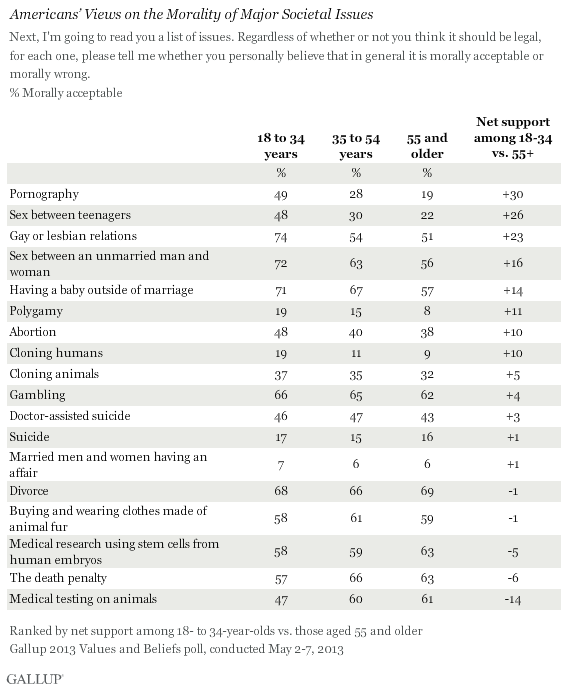
These data are from Gallup's 2013 Values and Beliefs poll, conducted May 2-7. Gallup has tracked Americans' views on the moral acceptability of 12 issues annually since 2001 and several others annually since 2002 or later. This is the first year the poll has measured public views on sex between teens.
As previously reported, Gallup's trends show majority acceptance of two -- having a baby outside of marriage and gay or lesbian relations -- being reached in the past decade, while acceptance of others has increased over the same time from a smaller to larger majority.
For many of these items, moral acceptance has seen significant change across all age groups, with the largest changes in acceptance of certain issues among Americans aged 55 and older. This is particularly true in Americans' attitudes toward gays and lesbians and having a baby outside of marriage, resulting in a shift from majority opposition to majority support over the past decade.
Other items -- such as divorce, premarital sex, and embryonic stem cell research -- have seen a slight increase in support among younger Americans and a dramatic increase among older Americans. Only on one issue -- attitudes toward animal testing -- has acceptance significantly declined, with the shift concentrated among those aged 18 to 34.
Older Americans' Support for Gay Relations Up 25 Percentage Points Since 2001
Americans' attitudes toward gay or lesbian relations have shown the greatest overall change over the course of Gallup's tracking, with moral acceptance increasing 19 points between 2001 and 2013.
Much of this change has occurred across the age spectrum. Acceptance of gay or lesbian relations among Americans aged 55 and older is now 25 points higher than it was in 2001. While Americans between the ages of 18 and 34 have consistently reported support for gay and lesbian relations at higher levels than older age groups, their support has also risen by 22 points in the past 12 years.
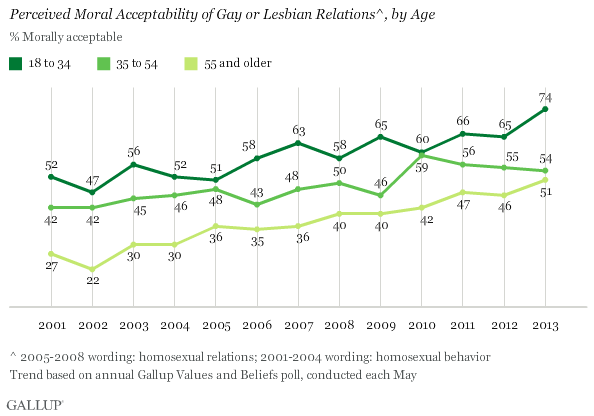
Those Aged 55 and Older Now More Accepting of Having a Baby Outside of Marriage
The percentage of Americans who say it is morally acceptable to have a baby outside of marriage has risen markedly over the past decade, from 45% to 60%, with the majority threshold first crossed in 2003 and consistently staying at that level since 2005. Since 2002, acceptance is up 16 points among adults aged 18 to 34 years and up 28 points among those aged 55 and older.
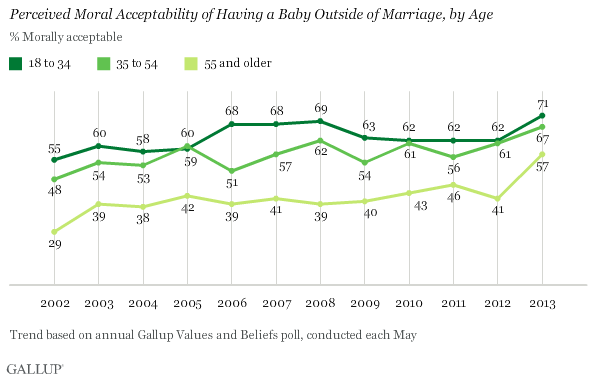
Overall Greater Acceptance of Premarital Sex Result of Older Americans Acceptance
Americans aged 55 and older are largely responsible for the overall 10-point increase in moral acceptance of sex between unmarried men and women since 2001, from 53% to 63%. Among this group, acceptance of premarital sex has increased by 22 points in 12 years, while these numbers have risen slightly among Americans younger than age 55.
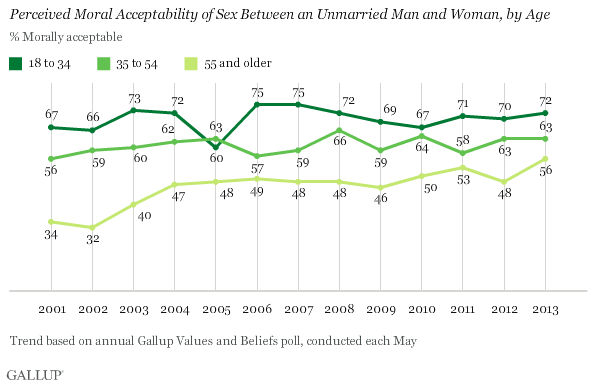
Older Americans Also Driving Overall Increased Acceptance of Divorce
The overall change in Americans' opinions on divorce is also largely a result of shifting views of those who are 55 and older. These Americans are now 21 points more likely to find divorce acceptable than they were in 2001. Meanwhile, attitudes toward divorce among those younger than age 55 have remained relatively flat.
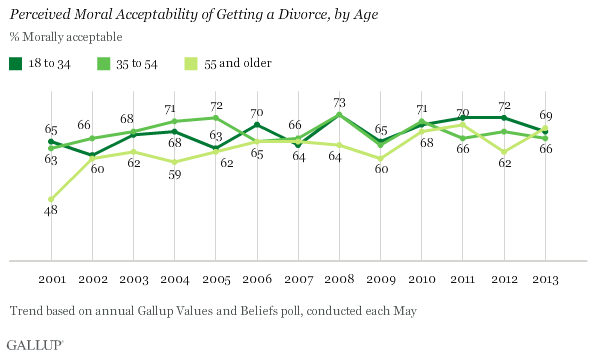
55+ Population Warms to Stem Cell Research
Much of the increase in moral acceptance of stem cell research has been driven by a change in the opinions of adults aged 55 and older. Acceptance among this older age group has risen by 20 points over the past 11 years. At the same time, support among Americans aged 35 to 54 has fallen off somewhat since its peak of 66% in 2005, but it remains about six points higher than it was in 2002. For the past few years, acceptance of stem cell research has leveled off among all age groups.
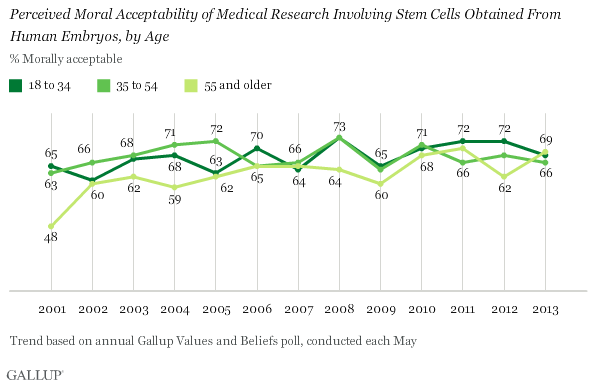
Less Support Among Younger Americans for Medical Testing on Animals
Though opinions on animal testing were essentially uniform across age groups in 2001, that pattern has changed over the past 12 years, as the overall percentage supporting it has declined from the mid-60s to the mid-50s. The greatest change has been among Americans between the ages of 18 and 34, for whom support for medical testing on animals has dropped by 18 points. Older Americans are now slightly less supportive of medical testing on animals compared with 12 years ago.
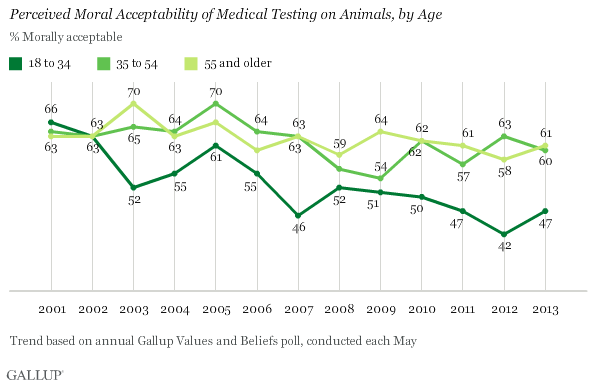
Bottom Line
Americans' fundamental views on several issues that define the nation's culture have changed in important ways since the start of the last decade. Gallup trends by age show that (in every case) increasing acceptance of several matters relating to sexual relations, as well as divorce and stem cell research, have moved closer to the views held by the youngest generation of Americans. In some cases, this has resulted in transformative change, with majority acceptance emerging in the past decade, and in others, it has resulted in expanded majority acceptance. Pornography and teenage sex now stand out as issues that could emerge as more broadly accepted in the future. However, this will largely hinge on whether today's young adults maintain these views into middle age -- i.e., teen parenting -- or whether they soften. Currently, overall acceptance of both is low, but this masks large generational gulfs with nearly half of young adults supportive versus roughly one in five adults aged 55 and older.
Survey Methods
Results for this Gallup poll are based on telephone interviews conducted May 2-7, 2013, with a random sample of 1,535 adults, aged 18 and older, living in all 50 U.S. states and the District of Columbia.
For results based on the total sample of national adults, one can say with 95% confidence that the margin of sampling error is ±3 percentage points.
Interviews are conducted with respondents on landline telephones and cellular phones, with interviews conducted in Spanish for respondents who are primarily Spanish-speaking. Each sample of national adults includes a minimum quota of 50% cellphone respondents and 50% landline respondents, with additional minimum quotas by region. Landline telephone numbers are chosen at random among listed telephone numbers. Cellphone numbers are selected using random digit dial methods. Landline respondents are chosen at random within each household on the basis of which member had the most recent birthday.
Samples are weighted to correct for unequal selection probability, nonresponse, and double coverage of landline and cell users in the two sampling frames. They are also weighted to match the national demographics of gender, age, race, Hispanic ethnicity, education, region, population density, and phone status (cellphone only/landline only/both, cellphone mostly, and having an unlisted landline number). Demographic weighting targets are based on the March 2012 Current Population Survey figures for the aged 18 and older U.S. population. Phone status targets are based on the July-December 2011 National Health Interview Survey. Population density targets are based on the 2010 census. All reported margins of sampling error include the computed design effects for weighting.
In addition to sampling error, question wording and practical difficulties in conducting surveys can introduce error or bias into the findings of public opinion polls.
For more details on Gallup's polling methodology, visit www.gallup.com.
